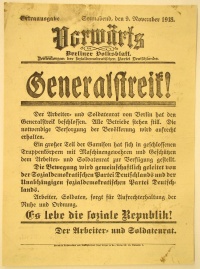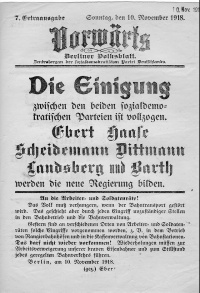Career before the War↑
On 20 September 1913, Friedrich Ebert (1871-1925) was elected as one of two chairmen of the Social Democratic Party (SPD). Hugo Haase (1863–1919) was the other chairman, and he held office two years longer than Ebert. The new leaders Ebert and Haase had neither the authority nor the experience that August Bebel (1840–1913) and Paul Singer (1844–1911) had built up in twenty years of party leadership.
The War Years↑
Just ten months after Ebert's election, the First World War broke out. The war initially plunged the SPD into severe internal party conflicts and, in 1917, led to the split of the party into the SPD and the USPD (Independent Social Democratic Party). In 1914, the SPD followed almost universally the idea of Burgfriedenspolitik, which meant approving the war credits in the Reichstag and dispensing with fundamental opposition to the monarchical system. However, a growing minority within the SPD, including Haase, was not willing to support this policy. Ebert tried in vain to preserve the unity of the party (dating back to 1875) and to unify the party factions from the left, represented by Karl Liebknecht (1871–1919) to the right, represented by Eduard David (1863–1930).
Career after the Party Split↑
After the party split in 1917, Ebert became parliamentary party leader as well, and he advanced to the top position within the party, surpassing Philipp Scheidemann (1865–1939), who was elected in 1917 to succeed Haase as chairman. It was only during the war that Ebert became a politician of national importance who spoke alongside Scheidemann in the great debates of the Reichstag. Ebert’s policy during the war was by no means frivolous, because all four of his sons were soldiers; two of them, Georg Ebert (1896–1917) and Heinrich Ebert (1897–1917), were killed in 1917.
During the Revolution↑
In the fall of 1918, Ebert pleaded vehemently for SPD participation in the final monarchical government, which was the first one to be formed on a parliamentary basis. Ebert was considered a moderate and pragmatist who was prepared to take on responsibility in parliament. For these reasons, as well as his strained relationship with Scheidemann, Prince Max von Baden (1867–1929) transferred to him the office of Chancellor on 9 November 1918. He gave this office up one day later to become a member of the revolutionary transition government (Rat der Volksbeauftragten).
Head of State↑
During the winter of 1918–1919, Friedrich Ebert was the most important policymaker in establishing a parliamentary democracy in Germany. As Reichspräsident, Friedrich Ebert at first rejected the Treaty of Versailles because he did not accept the terms of peace nor that Germany was solely responsible for the outbreak of the First World War. But within a few days he accepted as Realpolitiker, that Germany had to sign the peace treaty.
Bernd Braun, Friedrich-Ebert-Gedenkstätte
Section Editor: Christoph Jahr
Selected Bibliography
- Dowe, Dieter (ed.): Protokolle der Sitzungen des Parteiausschusses der SPD, 1912 bis 1921, inkl. Protokoll der Parteikonferenz in Weimar am 22. und 23. März 1919. Protokoll über die Verhandlungen der Reichskonferenz der Sozialdemokratischen Partei Deutschlands abgehalten in Berlin am 5. und 6. Mai 1920, Berlin; Bonn 1980: Dietz.
- Kotowski, Georg: Friedrich Ebert. Eine politische Biographie. Der Aufstieg eines deutschen Arbeiterführers 1871 bis 1917, volume 1, Wiesbaden 1963: Franz Steiner Verlag.
- Matthias, Erich / Pikart, Eberhard: Die Reichstagsfraktion der Deutschen Sozialdemokratie, 1898 bis 1918, Düsseldorf 1966: Droste.
- Miller, Susanne: Burgfrieden und Klassenkampf. Die deutsche Sozialdemokratie im Ersten Weltkrieg, Düsseldorf 1974: Droste.
- Miller, Susanne / Potthoff, Heinrich / Matthias, Erich: Die Regierung der Volksbeauftragten 1918/19, Düsseldorf 1969: Droste.
- Mühlhausen, Walter: Friedrich Ebert 1871-1925. Reichspräsident der Weimarer Republik, Bonn 2006: Dietz.










